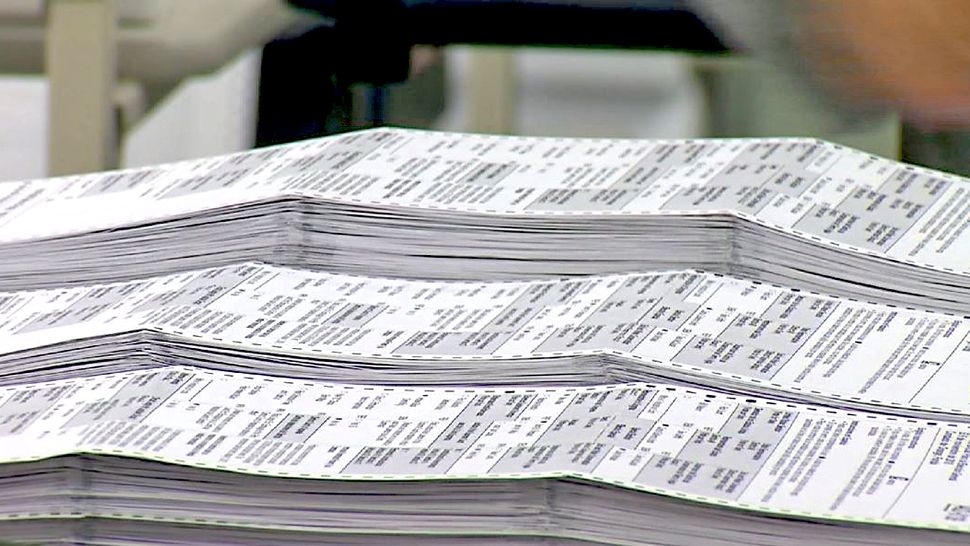WASHINGTON — After a Spectrum News investigation found the majority of Florida’s 67 counties were forced to forfeit thousands of dollars in federal election security funding ahead of the 2018 midterms, questions remain about funding ahead of the 2020 presidential election.
- Lawmakers, election officials split on election security funding
- Many wondering if states will receive more federal funds ahead of 2020
- RELATED STORIES:
After the Mueller report revealed Russians hacked two voting systems in the state in 2016, Florida lawmakers and local election officials have different perspectives about how to move forward.
Ahead of the 2018 midterms, Congress scrambled to deliver $380 million to states across the country to secure their elections.
With the presidential primaries nearly seven months away, many wonder if states will receive even more federal funds in the near future.
“I warn everybody that the more money, the bigger role the federal government plays in elections, the more they are going to want to control how they are conducted,’ Sen. Marco Rubio (R-Florida) said in an interview with Spectrum News.
The case against more funding
Some lawmakers like Rubio are hesitant about handing over more cash to states to spend on election security, pointing to a recent report released by the Election Assistance Commission, which found states only spent a fraction of the funds.
“It’s all at the beginning of implementing that. I think we need to work through that before we have even more federal engagement on these elections,” Rubio explained.
“If you’ve been given millions of dollars, and much of it has still yet to be spent, why would you put even more money behind it until you’ve spent what you have?” he questioned.
“I’m all for doing whatever it takes but let’s work through what we’ve already allocated before we put even more money on top of it,” Rubio added.
The case for more funding
Others in the Florida delegation disagree and say more federal funding is needed.
“Last year we basically had to wrestle Rick Scott and his Secretary of State in the division of elections to the ground in order to actually spend that money that was allocated to Florida in order to protect our elections,” said Rep. Debbie Wasserman Schultz (D-Florida).
Wasserman Schultz said she would like to see the Senate move on a wide-ranging bill that already has been passed in the House. It would approve the $500 million in 2019 and “whatever amounts are necessary in future years” for the Election Assistance Commission (EAC) to provide grants to states to put in place online and automatic voter registration.
“Making sure we adopt provisions related to election security and protecting the vote is absolutely essential,” Wasserman Schultz explained.
“At the very least, we need to make sure people have the opportunity to have their vote counted when they cast it, to be able to count on the fact that when they cast it, that it can’t be manipulated. They have to have confidence in the integrity in the election system and that their government is protecting the security of that system,” she said.
According to public records obtained by Spectrum News from the Florida Department of State, the State of Florida has already spent about 85 percent of the federal grant, despite some of the challenges local Supervisors of Elections faced in spending their cut, which resulted in 58 counties returning $1.4 million of the 14.5 million originally dispensed.
“With the technological threats emerging as they are, that requires resources. I’m very comfortable saying for myself and my colleagues that we could use what’s remaining, what we had to return and probably some more,” said Brian Corley, Supervisor of Elections for Pasco County.
Election officials want more help
Local election officials across the state appear to have the same view.
“I can absolutely guarantee that any additional funds that are sent our way by the federal government will not go to waste,” said Paul Lux, Supervisor of Elections for Okaloosa County.
The Florida Department of State tells Spectrum News it intends to spend the remaining $2.8 million to enhance cyber security ahead of 2020. However, election officials say they have no information about what to expect.
“We have yet to receive any guidance for how that money is going to be spent, whether it’s going to be allocated back to the counties who didn’t spend it as a first — second bite of the apple, or whether it's going to be divided up evenly, or whether it's going to be focused on smaller counties that have tighter budgets than bigger counties. Nobody knows,” Lux explained.
It’s unclear if Congress will approve any additional funding ahead of 2020. Now, local officials want members to recognize spending election cash in a meaningful way can’t happen overnight.
“Obviously sooner than later would be a plus to help us prepare,” Corley said.
The Florida Department of State said they are still evaluating ways to provide additional resources and funding to the Supervisors of Elections.
More efforts to increase federal funding for Election Security are expected on Capitol Hill over the next few months, with the government set to run out of money at the beginning of October.






